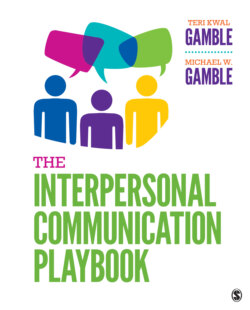Читать книгу The Interpersonal Communication Playbook - Teri Kwal Gamble - Страница 140
На сайте Литреса книга снята с продажи.
The Media and Perception
ОглавлениеBecause the mass media tend to depict us in ways that reinforce cultural views of race, culture, and gender, the more time we spend with media, the more accepting we tend to become of social stereotypes, and the more likely we are to help perpetuate the unrealistic and limiting perceptions presented to us.
How do stereotypes in media influence our expectations and relationships? First, they help us identify and generalize about what we consider to be appropriate behavior. They offer us categories into which people fit, and they provide us with an array of models in action so that when similar situations arise we think we know how to deal with them. Second, they provide us with perceptual shortcuts; they cause us to forget that we communicate with individuals, not stereotypes, and they contribute to our becoming lazy perceivers—too accepting of the inaccurate or false images presented to us. We need to acknowledge our role. An exploration of the web traffic of 148 news organizations demonstrates that publications across the political spectrum report on the same news daily, but we gloss over what we prefer not to see. Quite simply, we prefer information consistent with the beliefs and views we hold and go out of our way to avoid information that’s inconsistent.49
What are some of the specific lessons we learn from the media that help shape our perceptions? One lesson, which we glean from the significant underrepresentation of women and older people in leading roles in the media, is that men matter more than women (and younger males matter most). Even in news programming, stories about men outnumber stories about women.
A second media lesson involves our internalization of stereotypic portrayals of gender. Whereas media offerings present men as active, independent, powerful, and sexually virile, they portray women as the objects of males’ sexual desires, incompetent, manipulative, and passive. The media focus on women’s looks and their relationships with family members and others, while men are typically portrayed taking care of business.
A third lesson concerns the extent to which the media lead us to perceive minority groups inappropriately. Minorities have an even smaller media presence than women, for the most part being cast in supporting roles and often depicted as lazy, unlawful, dumb, or, in the case of Muslims, as terrorists. Even positive portrayals are based in stereotypes: The media tend to pigeonhole the Asian character as “the smart one” or the African American as “the athletic one.” There has been some recent improvement on this front, for instance with the success of Marvel’s film recent Black Panther, which features an almost entirely black cast, and the rising prominence of directors and creators of color, such as Ryan Coogler, Ava DuVernay, Taika Waititi, and Jordan Peele.
The media also influence our perception by molding our conceptions of the real world and people in ways that are inconsistent with facts. Heavy television viewers are more likely than those who view little TV to be fearful and to exaggerate the amount of violence in the world.50 Heavy viewers perceive the world to be meaner and a more dangerous place.51 Research demonstrates that by distorting our perception of risk, the media induce in us a sense of fear that is out of proportion with any actual danger.52 Such perceptions affect real-life judgments of what is safe, whom we should fear, and whom we are safe with. What steps can you take to counteract the false sense of reality brought to you by media?
Media lessons often cause us to misperceive reality. As they perpetuate what is unreal and untrue (even on so-called reality shows), they encourage us to reach for what is impossible. Because we use the media as reference points for what is normal, we are more likely to perceive ourselves, our relationships, and our lives as inferior by comparison. The media present the human body in perfect form, thus causing us to develop negative images of ourselves in comparison. The media’s unreal images perpetuate unrealistic perceptions of what our lives should be like and cause us to internalize and anticipate unreasonable outcomes from relationships.
